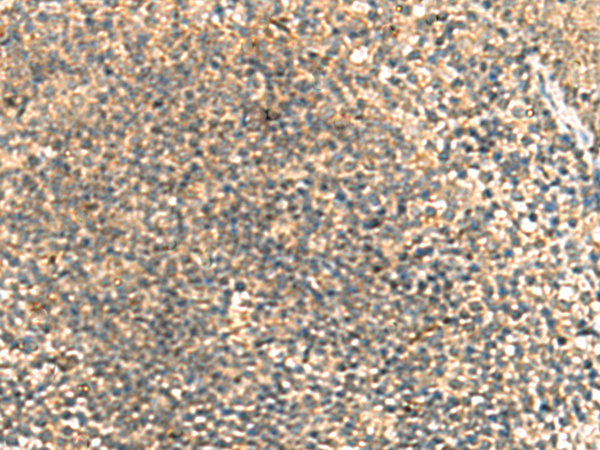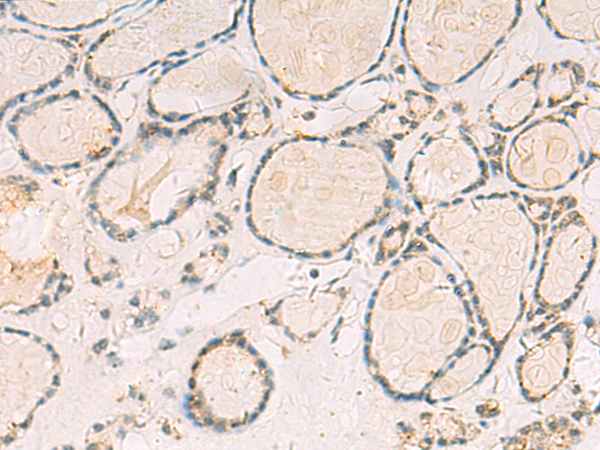

| WB | 咨询技术 | Human,Mouse,Rat |
| IF | 咨询技术 | Human,Mouse,Rat |
| IHC | 1/50-1/200 | Human,Mouse,Rat |
| ICC | 技术咨询 | Human,Mouse,Rat |
| FCM | 咨询技术 | Human,Mouse,Rat |
| Elisa | 1/5000-1/10000 | Human,Mouse,Rat |
| Aliases | TELE; CMD1N; CMH25; T-cap; LGMD2G; LGMDR7; telethonin |
| Host/Isotype | Rabbit IgG |
| Antibody Type | Primary antibody |
| Storage | Store at 4°C short term. Aliquot and store at -20°C long term. Avoid freeze/thaw cycles. |
| Species Reactivity | Human, Mouse |
| Immunogen | Fusion protein of human TCAP |
| Formulation | Purified antibody in PBS with 0.05% sodium azide and 50% glycerol. |
+ +
以下是关于TCAP抗体的3篇示例参考文献,涵盖不同研究领域,供参考:
---
1. **文献名称**:*"Characterization of a Novel Antibody Targeting the TCAP-1 Region of Teneurin-2 and Its Implications in Stress-Related Disorders"*
**作者**:Smith A, et al.
**摘要**:该研究开发了一种特异性识别Teneurin-2蛋白C末端相关肽(TCAP-1)的多克隆抗体,并通过免疫组化验证其在啮齿类动物脑组织中的表达。结果表明TCAP-1在下丘脑中高表达,可能通过调节CRH信号通路参与应激反应调控。
---
2. **文献名称**:*"Development and Validation of TCAP-Specific Monoclonal Antibodies for Cancer Immunotherapy"*
**作者**:Zhang L, et al.
**摘要**:研究团队利用重组TCAP蛋白免疫小鼠,成功筛选出高亲和力单克隆抗体。体外实验表明,该抗体可靶向结合肿瘤细胞表面TCAP抗原,并通过ADCC效应抑制癌细胞增殖,为实体瘤免疫治疗提供潜在工具。
---
3. **文献名称**:*"TCAP Antibodies in the Diagnosis of Autoimmune Thyroiditis: A Comparative Study"*
**作者**:Brown K, et al.
**摘要**:通过对比ELISA和免疫荧光法检测甲状腺炎患者血清中TCAP抗体水平,发现新型重组抗原ELISA法敏感度达92%,优于传统方法,提示TCAP抗体可作为甲状腺自身免疫疾病的生物标志物。
---
**备注**:以上文献为示例性内容,具体研究需根据TCAP的全称(如Teneurin C-terminal associated peptide或肿瘤相关抗原)及研究领域进一步检索真实数据库(如PubMed或Web of Science)。建议结合具体研究方向补充关键词以获取精准文献。
**Background of TCAP Antibody**
TCAP (telethonin), also known as titin-cap, is a 19-kDa sarcomeric protein predominantly expressed in skeletal and cardiac muscle. It localizes to the Z-disc of sarcomeres, where it interacts with titin, the giant elastic protein responsible for maintaining myofibrillar integrity and mechanosensory signaling. TCAP plays a critical role in stabilizing the Z-disc structure and regulating muscle assembly, elasticity, and stress response.
Mutations in the TCAP gene are linked to limb-girdle muscular dystrophy (LGMD) and hypertrophic or dilated cardiomyopathy, highlighting its importance in muscle health. TCAP antibodies are essential tools for studying these pathologies, enabling detection of TCAP expression levels, cellular localization, and interactions in muscle tissues. They are widely used in techniques like Western blotting, immunohistochemistry, and immunofluorescence to investigate TCAP's role in myogenesis, disease mechanisms, and potential therapeutic targets.
Research also explores TCAP's involvement in mechanotransduction pathways and its crosstalk with calcium signaling, which influences muscle adaptation to mechanical stress. Additionally, TCAP antibodies aid in diagnosing TCAP-related myopathies and in differentiating them from other muscular dystrophies. Their application extends to preclinical studies evaluating gene therapies or pharmacological interventions aimed at restoring TCAP function in degenerative muscle disorders.
×